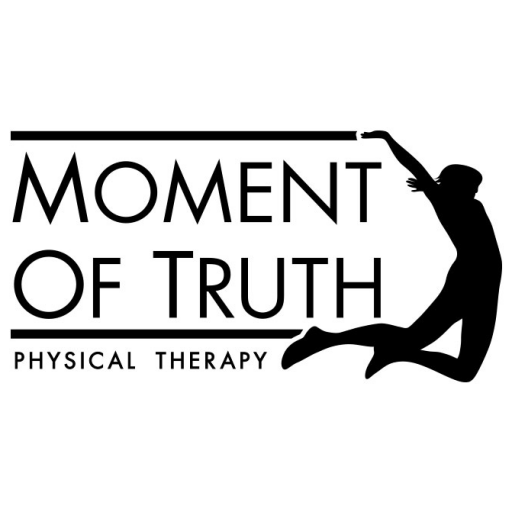When most women hear the word menopause, they picture hot flashes, night sweats, and maybe the occasional mood swing. What’s less often discussed is perimenopause, the 10–15 year stretch leading up to menopause that can begin as early as your mid-30s. That’s right. Many women spend more than a decade living in this “in-between” stage, often confused by sudden changes in their bodies and unsure of what’s normal.
At Moment of Truth Physical Therapy, we want to change that. Because when it comes to perimenopause, knowledge truly is power. Understanding what’s happening in your body can help you not only reduce pain and discomfort, but also reclaim energy, improve sleep, and even enjoy more satisfying intimacy.
What Exactly Is Perimenopause?
Perimenopause marks the gradual transition toward menopause, usually occurring between ages 35–50. During this time, your body begins to experience cyclical drops in estrogen, progesterone, and testosterone. These shifts can cause:
- Night sweats and hot flashes
- Insomnia or restless sleep
- Unexplained weight changes
- Vaginal dryness and painful sex
- Lower libido or waning orgasm intensity
- Mood swings or anxiety
- Decreased energy and slower workout recovery
Sound familiar? These symptoms can feel random, frustrating, and even frightening. But they all trace back to the delicate dance of your hormones, and once you understand how they work, you can take steps to feel better.
Hormones, Sleep, and Libido: The Connection
Hormones don’t just affect your period; they influence nearly every system in your body. Here’s how the big players show up during perimenopause:
- Estrogen supports serotonin and melatonin, the very hormones that help you fall asleep and stay asleep. As estrogen drops, so does sleep quality, and vaginal dryness often worsens.
- Progesterone is naturally calming and helps regulate your nervous system. When it dips, anxiety, restlessness, and more sleepless nights can follow.
- Testosterone fuels desire, energy, and workout recovery. As levels decline, libido and orgasm intensity may suffer.
- Cortisol, your stress hormone, tends to spike unpredictably in perimenopause. This can increase belly fat, zap your energy, and further sabotage your sex drive.
It’s no wonder so many women describe this stage as overwhelming. But here’s the good news: you don’t have to just suffer through it.
Steps You Can Take Right Now
Knowledge is power, but knowledge without action keeps you stuck. Here are evidence-backed steps that can help stabilize your hormones and reduce symptoms:
1. Focus on Nutrition
- Add protein to every meal to stabilize blood sugar and reduce cravings.
- Eat more fiber and omega-rich foods to support digestion, metabolism, and hormone balance.
- Save alcohol or sweets for earlier in the day rather than late at night, when they disrupt sleep most.
2. Support Your Body with Movement
- Try walking with a weighted vest to build bone density and promote calming, hormone-friendly exercise.
- Choose gentler, restorative workouts when possible, overdoing it with high-intensity cardio may increase cortisol and leave you more fatigued.
3. Prioritize Restful Sleep
- Shut off screens at least an hour before bed.
- Explore breathwork or relaxation techniques to calm your nervous system.
- Keep a consistent bedtime and wake-up time to regulate your circadian rhythm.
4. Get Your Hormones Checked Early
Don’t wait until menopause to ask for bloodwork. Getting a baseline hormone panel once you’ve finished having children (and breastfeeding) can give you valuable insights years earlier.
From there, you can explore options like bioidentical hormone replacement therapy under the guidance of a functional medicine doctor or naturopath.
What About Birth Control?
For many women in their late 30s and 40s, the pill or hormonal IUD has been part of life for decades. But here’s the catch: hormonal birth control essentially flatlines your natural peaks and valleys, masking what your body is really doing.
While this might prevent pregnancy, it can also:
- Lower testosterone (and therefore libido)
- Contribute to vaginal dryness
- Hide the early signs of perimenopause, making the eventual transition more abrupt
Non-hormonal options, like condoms, cycle tracking, or a copper IUD, may allow your body’s natural rhythms to show up more clearly. That said, the “best” birth control option is deeply personal, and our goal is simply to help you make informed decisions.
Painful Sex: A Common but Treatable Symptom
One of the most distressing symptoms of perimenopause is painful intercourse, often caused by vaginal dryness. While it may feel embarrassing to talk about, you are far from alone.
At Moment of Truth PT, we address this with:
- Pelvic floor therapy to improve blood flow, tissue mobility, and comfort
- Shockwave therapy to boost collagen and restore tissue health
- Education and resources for lubrication, vaginal estrogen cream (safe even for many cancer survivors), and other tools
Remember: painful sex is common, but it’s not something you just have to “live with.”
Reframing Perimenopause
Yes, perimenopause brings challenges. But it can also be a season of strength and renewal.
Many women find their 40s and 50s to be the most powerful, confident years of their lives. Careers are more established, children may need less hands-on care, and you may feel freer to focus on you.
When you support your body with the right tools, nutrition, sleep, movement, and medical support, this stage can actually bring:
- Better sex
- Deeper rest
- Increased strength and energy
- A healthier relationship with your body
You Don’t Have to Figure This Out Alone
If you’re noticing weight changes, sleep struggles, painful sex, or a fading libido, know that there is help. At Moment of Truth PT, we provide pelvic physical therapy and holistic resources to guide you through this transition.
Because when it comes to perimenopause, knowledge is power, and the right support can help turn pain into pleasure.
Ready to start the conversation? Contact us today to talk with one of our therapists about how we can support your perimenopause journey.


0 comments